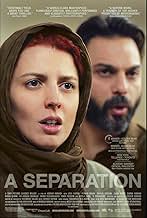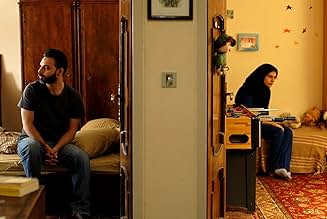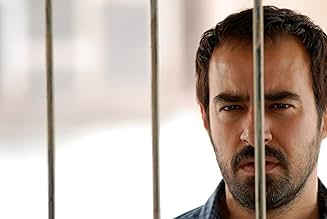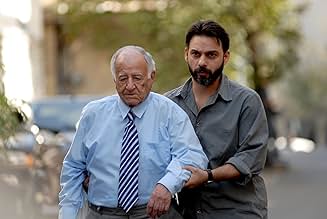Um casal é confrontado com uma decisão difícil, melhorar a vida de seu filho mudando-se para outro país ou ficar no Irã e cuidar de um pai que se deteriora e com Alzheimer.Um casal é confrontado com uma decisão difícil, melhorar a vida de seu filho mudando-se para outro país ou ficar no Irã e cuidar de um pai que se deteriora e com Alzheimer.Um casal é confrontado com uma decisão difícil, melhorar a vida de seu filho mudando-se para outro país ou ficar no Irã e cuidar de um pai que se deteriora e com Alzheimer.
- Ganhou 1 Oscar
- 89 vitórias e 52 indicações no total
Payman Maadi
- Nader
- (as Peyman Moadi)
Resumo
Reviewers say 'A Separation' delves into family, duty, societal expectations, and complex human relationships, exploring moral dilemmas, class distinctions, and cultural norms. It portrays intense emotions like tension, frustration, love, and betrayal through realistic interactions. The narrative is lauded for its complexity, presenting ambiguous moral questions without clear 'good' or 'bad' characters. The film is frequently praised for evoking deep emotional responses and provoking thought on universal human experiences.
Avaliações em destaque
A married couple are faced with a difficult decision, to improve the life of their child by moving to another country or to stay in Iran and look after a deteriorating parent who has Alzheimers (plot).
First thing iam sure this film will get nominated by the Academy for best foreign language film and i hope Mr.Farhadi won, because he deserved.
Secend thing the film present a very simple story about Nader and Simin have been planning to move to a European country to provide better opportunities, as Simin claims in the court, for their only daughter, Termeh (Sarina Farhadi).
Third thing, Nader refuse to leave his father and Simin need her daughter to go with her, but the problem with the daughter, she want one thing like all the children in the worlds, one house and lovable parents.
Finally, " this film really deserves to be considered as one of the film of the year and i deserves the high rating in IMDb site, "A Separation" was good example of a real-life movie which could help people to revise their ideas about important concepts like responsibility, love and sacrifice.
First thing iam sure this film will get nominated by the Academy for best foreign language film and i hope Mr.Farhadi won, because he deserved.
Secend thing the film present a very simple story about Nader and Simin have been planning to move to a European country to provide better opportunities, as Simin claims in the court, for their only daughter, Termeh (Sarina Farhadi).
Third thing, Nader refuse to leave his father and Simin need her daughter to go with her, but the problem with the daughter, she want one thing like all the children in the worlds, one house and lovable parents.
Finally, " this film really deserves to be considered as one of the film of the year and i deserves the high rating in IMDb site, "A Separation" was good example of a real-life movie which could help people to revise their ideas about important concepts like responsibility, love and sacrifice.
I'm an Iranian, but I've never been interested in Iranian cinema. I only watch Iranian films when they win awards or receive international recognition. I'm a fan of Kiarostami and Majidi, but I can't really say that I like all of their films. I watched Farhady's previous film (About Elly) about a year ago, and the first thing which struck me was how culturally detached the movie was in its depiction of an event. At the time, I believed this to have been the cause of this director's success. Watching Nader and Simin, however, proved that I was terribly mistaken.
Asghar Farhady's obsession with the concept of judgment is once again the driving force behind his latest feature. The life-like depiction of the Iranian courtroom (which is in no way impartial) places the audience in the Judge's seat from the very beginning. The extremely believable acting and insanely complex script compel the viewer to make up his/her mind just like when reading a court case. As for the screenplay, I'm almost certain the events in this film actually happened in real life, because in no way could one fabricate such a chaotically complex series of events, so beautifully woven into a coherent whole.
Despite being very Iranian in its narrative style and its depiction of Iranian culture (the sanctity of Family, faith, commitment towards parents and married life), I believe that this film could easily appeal to the Western audiences just like a film by Inaritu or Haneke (although I'm pretty sure it won't be nominated for an Oscar for political reasons).
After seeing About Elly, I thought Farhady's success was just a one-time fling, but coming out of the theater, having watched Nader and Simin, I was proud to have another Iranian director added to my international list of favorites.
Asghar Farhady's obsession with the concept of judgment is once again the driving force behind his latest feature. The life-like depiction of the Iranian courtroom (which is in no way impartial) places the audience in the Judge's seat from the very beginning. The extremely believable acting and insanely complex script compel the viewer to make up his/her mind just like when reading a court case. As for the screenplay, I'm almost certain the events in this film actually happened in real life, because in no way could one fabricate such a chaotically complex series of events, so beautifully woven into a coherent whole.
Despite being very Iranian in its narrative style and its depiction of Iranian culture (the sanctity of Family, faith, commitment towards parents and married life), I believe that this film could easily appeal to the Western audiences just like a film by Inaritu or Haneke (although I'm pretty sure it won't be nominated for an Oscar for political reasons).
After seeing About Elly, I thought Farhady's success was just a one-time fling, but coming out of the theater, having watched Nader and Simin, I was proud to have another Iranian director added to my international list of favorites.
10jsrees
This is the first Iranian film I've seen, and I'm recommending it to every-one I know. It is so well-crafted; the twists of the plot throw up new moral dilemmas for all the protagonists, which are explored sensitively and without judgement - so refreshingly unlike mainstream American films. I felt sympathy for all the characters, even the threatening Hodjat, full of misplaced rage which often erupts volcanically. And as a footnote, the film felt like an intimate view into a society that our news media portray as monochromatic and extremely foreign. (I am writing this a few days after the UK embassy in Tehran was ransacked)
10Radu_A
Asghar Farhadi's new film after the ingenious 'About Elly' is running for the Golden Bear at this year's Berlin Film Festival and, with half of the competition done and the rest of the program not looking too promising, appears to be an almost inevitable winner. Although maybe it won't for that very reason: Jahar Panahi's repeat inability to attend his jury duties because of Iran's government refusal to issue him a travel permit, a retrospective of his works including the 2006 Silver Bear-winning 'Offside', a variety of other Iranian productions and renewed demonstrations in Iran proper put the spotlight firmly on that country's elaborate, yet constrained film industry. All that buzz may outshine the film's artistic value, and prompt the jury to go for a less favored competitor. I should hope not, for Farhadi manages once again to embed lots of social criticism into a straight-laced, realistic narrative.
As in 'About Elly', the story begins rather unassumingly and takes an abrupt turn into a spiral of increasingly dramatic events: Nader and Simin are a couple about to break up over the question of moving abroad, for which they have obtained a permit after waiting for 18 months. Nader, however, has his father to take care of, who is suffering from Alzheimer's. Sirin still wants to leave, but not without her daughter (yes, pun intended) Termeh, a somewhat shy, bespectacled 11-year-old who cannot accept her parents' break-up. She therefore decides to stay with her father, which prompts Simin not to leave the country, but move to her mother. Nader is thereby forced to hire someone to take care of his dad, and a colleague of Sirin recommends the pregnant Razieh. Being deeply religious, she should not work in a single man's household, but her husband has been out of a job for a long time and is threatened with jail by his creditors. Her pregnancy and the necessity to attend to her daughter additionally stress her out. When Nader comes home one day to find his father left alone and tied to his bed, a struggle with the returning Razieh ensues, with catastrophic consequences for everyone around...
This is a much more complicated set-up than in 'About Elly', but it allows Farhadi to put a lot of additional information into his film as may be obvious to those who are just trying to follow the story (I hesitate to give examples because the film is as of yet to be released in Iran, which means an open-source comment such as this one needs to be carefully phrased). Much of the action takes place in courtrooms, where judges try to negotiate between the parties without any lawyers present. There's a lot of familiarity, and also a lot of menace, which succeeds to create the same climate of anxiety, accusation and deceit as in 'About Elly'. The realism of the narrative is embedded into a carefully planned scenography which makes almost every shot linger in the memory. And as in 'About Elly' the decisive moment, the one that solves the mystery is omitted in the picture, only to be explained verbally at the very end.
What makes me feel even more for this film is the fact that it might be the last film of its kind from Iran for some time. Ali Samadi Ahadi, the German-Iranian director of the comedy 'Salami Aleikum' and the upcoming documentary on the July 2009 protests 'The Green Wave', wrote that the film industry has come to a virtual standstill. 'Nader and Simin' was in development at the time of the protests; since then, regulations have become far more repressive, with even established masters like Kiarostami or Makhmalbaf forced to work abroad, and others threatened with jail and work prohibitions, of whom Panahi is only the most famous example. All the more reason to give this film the credit it deserves - winning Berlin may cause Iran's bureaucrats to reconsider, for cinema is almost the last link remaining to our world. Without film, how could we understand that Iranians are a modern people with issues like our own, and not dangerous fanatics as some media and politicians would have us believe?
As in 'About Elly', the story begins rather unassumingly and takes an abrupt turn into a spiral of increasingly dramatic events: Nader and Simin are a couple about to break up over the question of moving abroad, for which they have obtained a permit after waiting for 18 months. Nader, however, has his father to take care of, who is suffering from Alzheimer's. Sirin still wants to leave, but not without her daughter (yes, pun intended) Termeh, a somewhat shy, bespectacled 11-year-old who cannot accept her parents' break-up. She therefore decides to stay with her father, which prompts Simin not to leave the country, but move to her mother. Nader is thereby forced to hire someone to take care of his dad, and a colleague of Sirin recommends the pregnant Razieh. Being deeply religious, she should not work in a single man's household, but her husband has been out of a job for a long time and is threatened with jail by his creditors. Her pregnancy and the necessity to attend to her daughter additionally stress her out. When Nader comes home one day to find his father left alone and tied to his bed, a struggle with the returning Razieh ensues, with catastrophic consequences for everyone around...
This is a much more complicated set-up than in 'About Elly', but it allows Farhadi to put a lot of additional information into his film as may be obvious to those who are just trying to follow the story (I hesitate to give examples because the film is as of yet to be released in Iran, which means an open-source comment such as this one needs to be carefully phrased). Much of the action takes place in courtrooms, where judges try to negotiate between the parties without any lawyers present. There's a lot of familiarity, and also a lot of menace, which succeeds to create the same climate of anxiety, accusation and deceit as in 'About Elly'. The realism of the narrative is embedded into a carefully planned scenography which makes almost every shot linger in the memory. And as in 'About Elly' the decisive moment, the one that solves the mystery is omitted in the picture, only to be explained verbally at the very end.
What makes me feel even more for this film is the fact that it might be the last film of its kind from Iran for some time. Ali Samadi Ahadi, the German-Iranian director of the comedy 'Salami Aleikum' and the upcoming documentary on the July 2009 protests 'The Green Wave', wrote that the film industry has come to a virtual standstill. 'Nader and Simin' was in development at the time of the protests; since then, regulations have become far more repressive, with even established masters like Kiarostami or Makhmalbaf forced to work abroad, and others threatened with jail and work prohibitions, of whom Panahi is only the most famous example. All the more reason to give this film the credit it deserves - winning Berlin may cause Iran's bureaucrats to reconsider, for cinema is almost the last link remaining to our world. Without film, how could we understand that Iranians are a modern people with issues like our own, and not dangerous fanatics as some media and politicians would have us believe?
this is one of the most heart breaking and real movies I have seen this year. you can not leave the movie for even 1 second and characters are such real ones that you start to put yourself in their position and think what would I do? it is a must see movie as Turkish drama lover person i may suggest every drama fan to watch this breath taking real natural real movie. these Iranian people are god's blessings bravo... the actor is like born to act as if he is living his real life. the relationship between daughter and father and wife and husband seem so natural for those who know that culture. I should also add that the performance of the cleaner woman is very satisfactory.
Enredo
Você sabia?
- CuriosidadesDirector Asghar Farhadi's first idea for the movie was the image of a man washing his father who had Alzheimer's. He built the rest of the film around that scene.
- Erros de gravaçãoAlthough Razieh had gone to the doctor to see if her baby was still alive a few hours before she was beaten by Nader, the judge never asked her about the result of the medical check. Also, after medical examination, it should be clear for Razieh to know about the situation of her baby unless she couldn't reach the doctor at the time.
- ConexõesFeatured in Ebert Presents: At the Movies: Episode #2.12 (2011)
Principais escolhas
Faça login para avaliar e ver a lista de recomendações personalizadas
Detalhes
Bilheteria
- Orçamento
- US$ 500.000 (estimativa)
- Faturamento bruto nos EUA e Canadá
- US$ 7.099.055
- Fim de semana de estreia nos EUA e Canadá
- US$ 59.481
- 1 de jan. de 2012
- Faturamento bruto mundial
- US$ 22.926.076
- Tempo de duração2 horas 3 minutos
- Cor
- Mixagem de som
- Proporção
- 1.85 : 1
Contribua para esta página
Sugerir uma alteração ou adicionar conteúdo ausente
































